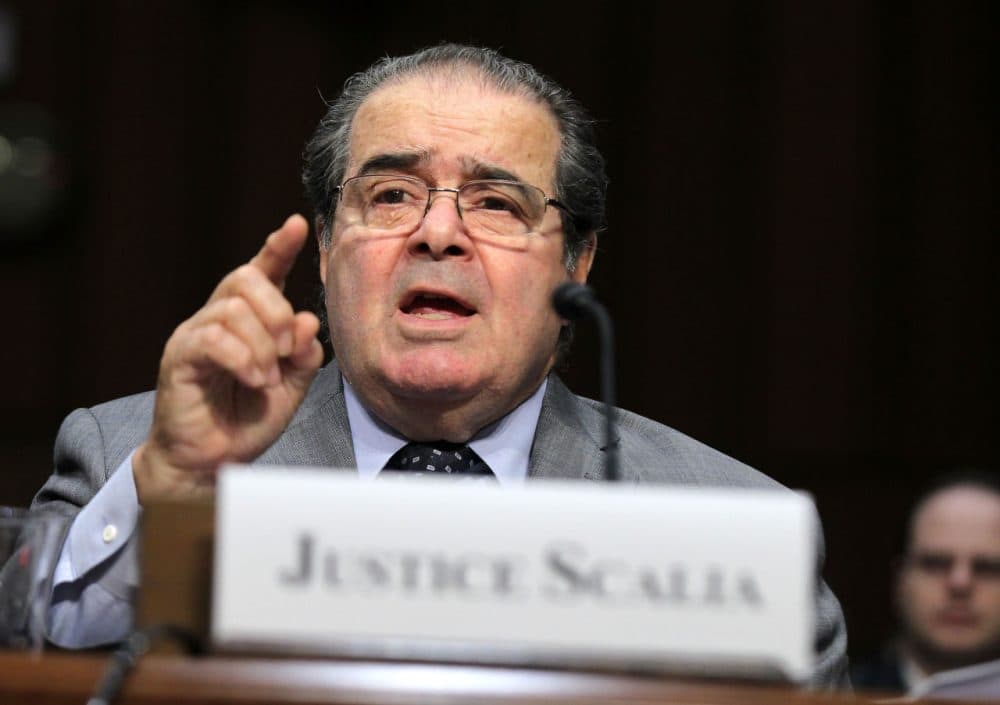Advertisement
Justice Scalia's Legal Legacy
Resume
From his colorful dissents to his controversial theories of constitutional "originalism," Justice Antonin Scalia changed the U.S. Supreme Court - and American legal thought - forever. Princeton University professor of jurisprudence Robert George joined Here & Now's Robin Young to discuss Scalia's powerful legal legacy.
Interview Highlights: Robert George
You considered Justice Scalia a friend?
“Oh yes, we were good friends and he visited frequently at Princeton and I took my students down for visits to the Supreme Court. He hosted us for oral arguments and met with the students privately. I also knew him and his wife, Maureen, and their family quite well."
What will he be remembered for?
“Originalism is his legacy, it’s the idea that the Constitution is the text. Things should not be imported into the text that are not there, and that the judge in interpreting the text should be guided by the original understanding of the words on the page, that is, the words as they were understood by the public, by the people who ratified those words, making them part of the fundamental law of the land.”
Give us some examples of when he held fast to that style of thinking.
“Famously of course, he is a critic of Roe v. Wade, the abortion decision that created a legal right to abortion across all 50 states. Scalia regarded this as an ‘abomination,’ not because he was pro-life, which of course he was, but rather because he believed what the court had done in this case is simply read into the Constitution something that was not there, thus depriving the people, the democratically constituted people, of their authority under the Constitution to decide what the law would be. Now, the very same Justice Scalia, applying the very same principles, ruled that the burning of the American flag constitutes protected speech under the 1st Amendment and therefore may not be criminalized. Now Scalia certainly opposed the burning of the American flag. He was a fierce patriot and I suspect that he would have had no sympathy whatsoever, in fact I can tell you for sure he had no sympathy whatsoever for radicals, be they of the right or the left, who would do something like burn the American flag, and yet he felt that the constitutional principle of free speech, as historically and originally understood, forbade states or the national government from prohibiting the burning of the flag. He was willing to follow the logic of his originalism wherever it led. He famously said that if a judge does not sometimes hand down rulings that go contrary to his own political judgement, then the judges are not being faithful to the Constitution.”
On his tactics, choice of words and comments on previous court decisions
“Well, I wouldn’t say they were tactics. If I can refer to them by the name his friends used, it was ‘Nino being Nino.’ I don’t think he had an alternative, he could not be anyone other than himself. There was a certain irascibility about him, there was no question about that, and certainly an insistence on speaking his mind, but despite his rough and tumble play with his fellow justices, he was able to maintain very good friendships. Indeed, his closest friend was the member of the court ideologically furthest from him - Ruth Bader Ginsburg. They were old and dear friends going all the way back to when they served together on the U.S. Court of Appeals for the District of Columbia circuit before they went on to the Supreme Court.”
On a student’s interaction with Scalia about the subject of homosexuality
“What Scalia was doing was pointing out that an objection to conduct need not reflect animus against the person who engages in the conduct. It’s a simple idea, it’s also true, it has the great advantage of being true, but sometimes unless you looked very closely or were charitable in reading him, people would find what he said offensive.”
Scalia said to the student, “if we cannot have moral feelings against homosexuality, can we have it against murder, can we have it against these other things? Of course we can.” But some may still find that offensive.
“Yes, and that particular student did. I think he was wrong to [find it offensive]. He might think that I was wrong to think that he was wrong about that. He certainly thought that Scalia was wrong. But we really value our students speaking up and I’m glad that he didn’t feel intimidated, he felt entirely open, and Scalia encouraged that, by the way. He not only would argue aggressively himself, he would have no objection to people arguing aggressively back toward him, as this student did. I thought it was just a wonderful moment.”
Guest
- Robert George, professor of jurisprudence at Princeton University and a visiting professor at Harvard University. He tweets @McCormickProf.
This segment aired on February 15, 2016.